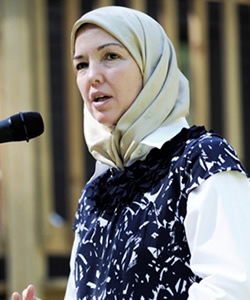Sharing Sacred Space in the Holy Lands: Is Conflict Inevitable?

Tuesday, November 19, 2024
6:00 p.m. - 7:30 p.m. EST
Location:
Gewirz Student Center 12th Floor, 120 F STREET NW Map
Holy sites raise critical issues of theology, law and politics. Some scholars argue that because they are “indivisible,” control over these sites is essentially a zero-sum game. Other scholars argue that sharing space can be facilitated by suitable tools of conflict management and conflict resolution. For example, changes in religious rules, such as time and place regulations, has helped to sustain new narratives and attitudes towards sacralization and the symbols that they might represent.
Taking as a springboard the work of Professor Marshall Breger, co-author of The Contest and Control of Jerusalem's Holy Sites (Cambridge University Press, 2023), this panel discussed the history and prospects of sharing the Holy Land’s sacred sites, including the Temple Mount / Haram al Sharif, and the Church of the Holy Sepulchre. It also expanded the discussion to examples of sharing sacred space in other places.
This event was convened by the Georgetown Law Office of Mission & Ministry and the Berkley Center for Religion, Peace and World Affairs.
Photo courtesy of Wikimedia Commons user Andrew Shiva
Discover similar content through these related topics and regions.
Image Gallery
Image Gallery
/6

Amelia ("Amy") Uelmen, a Berkley Center senior research fellow, opens the event.

Ingrid Mattson, author of "The Story of the Qur’an" (2013), offers remarks during the panel discussion.

Rev. Joseph Sievers, former professor of Jewish history at the Pontifical Biblical Institute in Rome, offers remarks.

Marshall Breger, co-author of "The Contest and Control of Jerusalem's Holy Sites," discusses sharing sacred spaces.

Rabbi Abraham Skorka talks to Sievers and another attendee during the post-event reception.

Attendees exchange insights during the reception.




